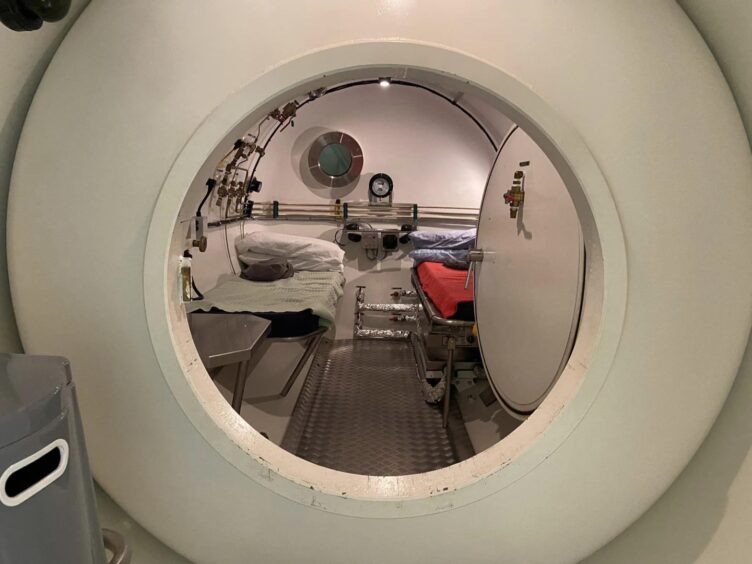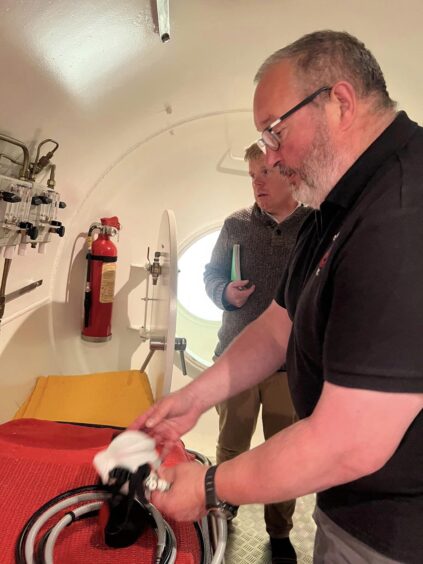
Injured deep sea divers on the west coast of Scotland are facing long journeys and potential “loss of life” after a key facility lost its NHS contract.
The man in charge of running Oban’s hyperbaric chamber has voiced concern for the lives of stricken divers since the NHS failed to renew its contract with the recompression chamber on Scotland’s west coast.
This has forced divers with decompression sickness to make a 180-mile journey to the nearest hyperbaric chamber in Aberdeen.
That delay also heightens the risk of long-term damage for divers suffering from the injury, also called the bends.
In severe cases, those afflicted can suffer from numbness, tingling, arm or leg weakness, unsteadiness, vertigo, difficulty breathing and chest pain. This presents symptoms similar to that of a stroke.
The effective closure of the hyperbaric centre is also having a knock on effect on the region’s burgeoning aquaculture sector as businesses consider relocating to areas with facilties to ensure divers safety.
Martin Sayer, managing director of Tritonia Scientific which ran the recompression chamber, told Energy Voice: “We’ve certainly had divers come into our unit who have been deteriorating and have not been very well.
“You would look at those people and say: What would have been the outcome if they had been further delayed?”
He admitted that this evidence “isn’t overly strong” and is “anecdotal” but, he that previous patients he had treated “would have done badly” if they had not received treatment when they did.He said that “loss of life” would have been a possibility for some of the sick divers Mr Sayer and his team of four specially trained doctors have treated.
Category 1 classification ‘slightly misleading’
When confronted with these concerns, an NHS Grampian spokesperson said: “We have carried out a site visit at the facility in Oban and we are now compiling the results of that visit. They will be shared with the team there when ready.
“In the meantime, the national hyperbaric service continues to operate from a Category 2 chamber in Orkney and the main Category 1 chamber in Aberdeen.”
According to the NHS, Category 1 chambers are for those who are most seriously unwell while Category 2 chambers handle those with less severe cases.
However, this classification is “slightly misleading”, Sayer explained: “Category 1 patients are extremely rare, I’ve been involved with the open chamber now for over 30 years and in that time, I think we’ve only ever seen one Category 1 patient who was still alive when they presented at A&E.
“The unfortunate fact is most Category 1 patients don’t survive long enough to actually get to A&E, let alone get to the compression chamber.”
‘Businesses already now looking to leave’ Oban
There has been an outcry for the Scottish diving community as nearly 15,00 people have signed a petition to secure NHS funding at Oban.
Local politicians have voiced support, but since the announcement of the 4 July UK general election, progress in Westminster has slowed.
However, the issue is still being raised in Holyrood.
Tim Eagle, regional MSP for Highlands and Islands, asked the Scottish Government on Thursday if it had held discussions with stakeholders regarding the impact of the NHS choosing to not renew its contract with the Oban chamber.
Jenni Minto, MSP for Argyll and Bute, responded: “The Scottish Government is aware that the contract for NHS hyperbaric medicine services in Oban ceased on 31 March and the chamber has not been operational for NHS patients since January.”
She added that a “review of the facility is ongoing” and that the government is in conversation with the NHS as this process continues.
Ms Minto concluded: “We are being kept updated as review of the situation continues and have been assured risk is minimised and plans are in place for the timely transfer and treatment of patients.”
To this, Tim Eagle voiced the concern of people in his region as he said: “Some local businesses in the aquaculture sector are considering relocating nearer to sites that have an active NHS hyperbaric chamber.”
Outcry from the diving community
He said that NHS Grampian has confirmed that the decision not to renew the Oban chamber’s contract was “not taken for financial reasons” as he urged the government to reinstate the facility.
Following a recent trip to the Oban chamber Mr Eagle said: “My frustration of this effective closure is the economic impact on a growing and incredibly important aquatic industry in the area with businesses already now looking to leave.”
At the time of the chamber’s closure, Derek Beddows, Neptune Energy’s diving technical authority and former BP global diving boss, said: “Any suspected DCI [decompression illness] requires immediate recompression, pretty difficult when the nearest NHS-supported facility could be up to 6 hours away.”
He also shared his concern about the availability of transport: “Ambulances are not always available for this journey and a helicopter transfer comes with its own challenges.”

 © Supplied by NHS Grampian
© Supplied by NHS Grampian © Supplied by Tim Eagle on Faceboo
© Supplied by Tim Eagle on Faceboo